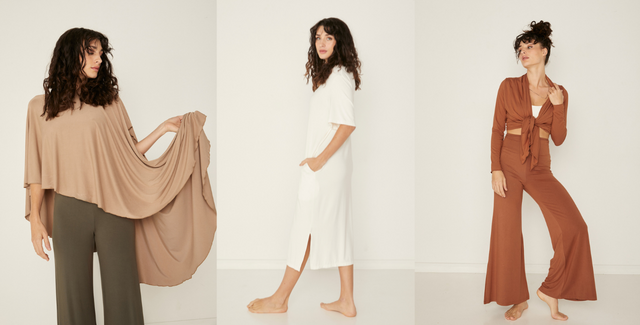The fashion industry has witnessed a significant shift towards sustainability in recent years. With environmental concerns taking centre stage globally, eco-friendly fashion has transformed from a niche market into a major sustainable fashion trend. In 2024, this fashion trend continues to evolve, incorporating innovative materials, processes and designs that emphasise minimal environmental impact.
The rise of eco-friendly materials
As we navigate through 2024, the shift towards sustainable materials continues to be a major driving force in eco-friendly fashion trends. Brands are progressively adopting more sustainable alternatives such as organic cotton, recycled polyester and innovative textiles including hemp, Bamboo and lyocell.
Organic cotton is grown without the harmful pesticides and chemicals typically used in conventional cotton farming, reducing environmental toxins and often using less water. Recycled polyester repurposes existing plastic, diverting waste from landfills and reducing the demand for new petroleum extraction.
Bamboo stands out for its rapid growth and minimal need for water and pesticides, making it an ideal resource for sustainable fashion. As a material, Bamboo is highly praised for its softness and breathability, offering comfort without compromising on environmental commitments. Its fibres can be processed into a smooth, luxurious fabric that appeals to eco-conscious consumers who do not wish to sacrifice quality for sustainability.
Hemp and lyocell are notable for their sustainable growth characteristics; hemp and Bamboo grow quickly and require minimal resources, while lyocell is produced from wood pulp in a closed-loop system that recycles almost all chemicals used.
These materials contribute significantly to reducing the dependency on synthetic fibres, notorious for their environmental damage, thereby promoting a more sustainable production cycle within the fashion industry.
Technological advancements in sustainable fashion
Technology plays a pivotal role in the advancement of eco-friendly fashion. Digital fabric printing, for instance, has drastically reduced the waste associated with traditional dyeing processes. This technology allows for the precise application of dyes, reducing excess and runoff that can lead to environmental pollution.
Furthermore, integrating Artificial Intelligence (AI) in design and manufacturing processes optimises the use of materials, effectively reducing waste. AI algorithms can predict the amount of fabric required for garments, adjust patterns to maximise cutting efficiency and automate assembly lines to decrease resource use.
These technological enhancements not only bolster sustainable practices but also improve the overall efficiency of the fashion supply chain, aligning with the increasing consumer demand for environmentally responsible products.
Ethical manufacturing and transparency
The modern fashion consumer demands transparency and ethical production, which has prompted significant changes in industry operations. Many brands have revamped their manufacturing processes to ensure fair wages and safe working conditions, responding to global calls for more responsible business practices.
In support of these efforts, blockchain technology has become a crucial tool. It provides a verifiable and transparent record of the entire supply chain, allowing consumers to track the origins of their garments. This ensures that their purchases are ethically made, fostering a culture of accountability and trust between brands and their customers.
Circular fashion — beyond recycling
Circular fashion embodies a transformative approach to sustainability. It emphasises the continuous use of garments through reuse, repair and recycling, thereby significantly reducing waste and prolonging the lifecycle of clothing.
This model is supported by various initiatives gaining momentum worldwide. Clothing swaps allow individuals to exchange garments they no longer wear for others' unwanted items, revitalising wardrobes without new resource expenditure. Second-hand boutiques provide a marketplace for pre-owned clothing, offering consumers stylish options without contributing to new production emissions.
Furthermore, upcycling workshops are becoming increasingly popular, teaching skills like sewing and modification to give old garments new life.
These activities reinforce the concept that sustainable fashion involves more than purchasing eco-friendly products, it requires a fundamental shift in our consumption habits to prioritise sustainability and waste reduction.
Consumer shifts — the demand for durability
The modern eco-conscious consumer increasingly values durability and quality over mere novelty in their apparel. This discerning attitude is reshaping brand strategies, propelling them towards offering garments characterised by timeless design and robust materials that withstand the test of time.
By focusing on quality over quantity, brands are aligning with the sustainable ethos of reducing waste and decreasing the frequency of purchase cycles. This sustainable fashion trend not only supports sustainable consumption but also cultivates a 'less is more' philosophy in fashion. It encourages consumers to invest in fewer, higher-quality pieces that maintain their appeal and functionality over many seasons, thus fostering a more sustainable relationship between people and their clothes.
The role of fashion activism
Fashion activism is reshaping consumer behaviour and brand strategies in sustainable fashion. Influencers, celebrities and activists are leveraging their significant online and offline platforms to promote eco-friendly and ethical fashion choices.
Through social media campaigns, public discussions and collaborative projects with sustainable brands, these figures are crucial in raising awareness about sustainable fashion. Their efforts help drive consumer preference towards eco-friendly choices, thereby pushing brands to adopt more environmentally friendly and ethical practices. This activism not only educates the public but also cultivates a community of informed consumers who prioritise sustainability in their fashion choices.
The future of fashion is green with Bodypeace Bamboo
The growing consumer awareness and demand for eco-friendly products are pushing brands to reconsider their practices and align with more sustainable operations.
In the spirit of sustainable and eco-conscious living, Bodypeace Bamboo offers a range of Bamboo clothing for both women and men. Our products promise comfort and style and align with your values of preserving the environment. Explore our collection online or visit any of our stores to join us in making a positive impact on the planet.
Discover how sustainable fashion can be a part of your lifestyle with Bodypeace Bamboo.









